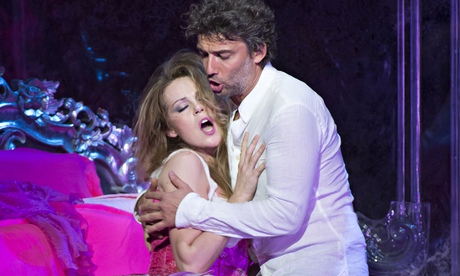Originally posted by amateur51
View Post
Does it matter what opera singers look like?
Collapse
X
-
Both, perhaps: "prejudice and superficiality" = Ochs; "accepting the inevitability of change & loss" = the Marschallin; with Octavian (and Faninal perhaps) moving from one to the other?Originally posted by Flosshilde View PostHmm - Keith Bruce in Saturday's Herald reckons it's a "tale of prejudice and superficiality". I've always thought it's about accepting the inevitability of chamge and loss.[FONT=Comic Sans MS][I][B]Numquam Satis![/B][/I][/FONT]
Comment
-
-
Originally posted by Flosshilde View PostThinking about it, perhaps not so much loss - how long will it take Octavian to tire of Sopie's innocent charm & return to the experienced older woman, who can still probably teach him a thing or two? Please leave some of us with our illusions!
I keep hitting the Escape key, but I'm still here!
Please leave some of us with our illusions!
I keep hitting the Escape key, but I'm still here!
Comment
-
-
 Richard Tarleton
Richard Tarleton
Originally posted by Flosshilde View PostThinking about it, perhaps not so much loss - how long will it take Octavian to tire of Sopie's innocent charm & return to the experienced older woman, who can still probably teach him a thing or two? And Sophie is destined to end up taking a lover herself eventually, or end up sad and betrayed like Mozart's Countess....mind you in the libretto Sophie has a mind of her own so perhaps there's hope.
And Sophie is destined to end up taking a lover herself eventually, or end up sad and betrayed like Mozart's Countess....mind you in the libretto Sophie has a mind of her own so perhaps there's hope.
Comment
-
Dame Anne Evans is certainly right. Opera defintely is about theatre.Originally posted by Richard Tarleton View PostAms, Canning describes the Act 1 Mariandl scene as the only bit in which Erraught looks comfortable, and suggests there is barely a hint of the "randy 17-year old who is bedding a married woman old enough to be her [sic] mother...". None of us has so far seen this production - I just pass this on!
My three live Octavians (in what is one of my favourite operas) have all passed the disbelief-suspending test in this gender-bending role with flying colours - Susan Graham, Katerina Karnéus and Diana Montague.
PS - just spotted - on p 26 of the main section of the Sunday Times, a longish article by Dame Anne Evans (who is going to see this production next month) coming down on the side of the critics. Key sentence: "During a long career in opera I have always found how you look to be a key part of the experience. Indeed, it is important to choose people of the right body type to play the roles. If you don't think opera is about theatre, then you're in the wrong business". Further down she says that "the myth of the fat soprano is exactly that - a myth..." Agreeing with Beef Oven, she says "Who wants to see a Mimi...dying of consumption at 20 stone?".
Comment
-
-
There are some nice pictures of the young lady who seems to have been the focus of attention by the critics:
Classical music blog by journalist and author Jessica Duchen. Topics include classical music, opera, ballet, recordings, books. London, UK.
Having recently seen the Glyndebourne production it took me a long while to even think about the fuss which has been made about this, or realise that I was viewing such a "controversial" event - didn't even occur to me until very late on through the opera. Perhaps more to the point, and commented on by several other members of the audience, is that "Octavian" is somewhat shorter than Sophie. Different make up and costumes could have given significantly different effects, though the height issue was more inherent.
Perhaps the critics zoomed in on this to avoid other issues with the production. Overall it worked rather well, though clearly some others have seen other productions which they preferred. I have only ever seen one other, so I have limited basis for comparison.
Critics do also get other things wrong - see http://www.telegraph.co.uk/culture/m...er-review.html in which we read "Overhead, a station clock reminds us that time marches inexorably on, one step ahead of us all. " Didn't the critic notice or even think about the fact that the clock does not change? This is explained very early on, when the Marschallin states that she gets up in the middle of the night to stop the clocks - as she is clearly worried about getting old.
Comment
-
-
Not sure why/if this is "more to the point", Dave (and taking your "perhaps" into consideration); lots of men are "somewhat shorter" than their partners. Can it be that the problems are entirely those of the members of the audience who expect Opera to conform to ideas of "beauty" originating more from Hollywood than from their own experience?Originally posted by Dave2002 View PostPerhaps more to the point, and commented on by several other members of the audience, is that "Octavian" is somewhat shorter than Sophie. Different make up and costumes could have given significantly different effects, though the height issue was more inherent.
Critics do also get other things wrong - see http://www.telegraph.co.uk/culture/m...er-review.html in which we read "Overhead, a station clock reminds us that time marches inexorably on, one step ahead of us all. " Didn't the critic notice or even think about the fact that the clock does not change? This is explained very early on, when the Marschallin states that she gets up in the middle of the night to stop the clocks - as she is clearly worried about getting old.

 [FONT=Comic Sans MS][I][B]Numquam Satis![/B][/I][/FONT]
[FONT=Comic Sans MS][I][B]Numquam Satis![/B][/I][/FONT]
Comment
-



Comment